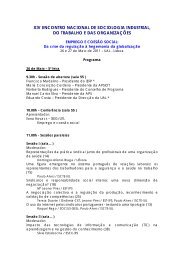Web-based Learning Solutions for Communities of Practice
Web-based Learning Solutions for Communities of Practice
Web-based Learning Solutions for Communities of Practice
Create successful ePaper yourself
Turn your PDF publications into a flip-book with our unique Google optimized e-Paper software.
The Argentine IT Pr<strong>of</strong>essionals Forum<br />
IT experts may not be the champions <strong>of</strong> transparent<br />
processes or <strong>of</strong> participation through ICT.<br />
They may just be good pr<strong>of</strong>essionals.<br />
OTHER EXPERIENCES<br />
Some current government policies encourage<br />
CoPs as strategic lines <strong>of</strong> action, such as in<br />
Canada, 27 the United States, Australia, 28 and other<br />
countries. These lines <strong>of</strong> action are oriented toward<br />
rein<strong>for</strong>cing federal policies as well as supporting<br />
government<br />
structures in complex processes. This is the<br />
case <strong>of</strong> e-government plans when a government<br />
wants to change and integrate the institutional,<br />
cultural, and technological systems.<br />
The developments implemented by the abovementioned<br />
administrations have key government<br />
authorities as their sponsors. Such was the case<br />
with Al Gore in the United States when he was<br />
the vice president <strong>of</strong> that country (“Reinventing<br />
Government,” 1998). Conversely in Argentina,<br />
as far as IT areas, this initiative stems from the<br />
public-management undersecretariat and the<br />
ITNO (which depends on the <strong>for</strong>mer). In view<br />
<strong>of</strong> this categorization, it is difficult to undertake<br />
a political strategy as strong as those from the<br />
previously mentioned countries.<br />
This emerging complementary relationship<br />
between CoPs and the bureaucratic structures is<br />
an interesting strategy given that CoPs constitute<br />
an effective way <strong>of</strong> solving unusual problems,<br />
sharing knowledge beyond traditional structural<br />
borders through the coexistence <strong>of</strong> in<strong>for</strong>mal integration<br />
models and bureaucratic models. Within<br />
these interrelationships, <strong>for</strong>mal structures can<br />
be fed by the production generated in turn by<br />
CoP members. The different CoPs intertwine in<br />
a blurred way and cut across the organizational<br />
arena (Tuomi, 1999). These CoPs also contribute<br />
the improvement <strong>of</strong> teams that are set up <strong>for</strong> specific<br />
government projects (such as e-government),<br />
recognizing that <strong>for</strong>mally managed projects work<br />
best when the following are true:<br />
1. Problems can be clearly defined.<br />
2. Reliable, quantifiable measurements are<br />
established.<br />
3. An authority structure is in place to ensure<br />
that project results get implemented.<br />
Additionally, communities are most effective<br />
when they follow certain criteria, as follows:<br />
1. Problems are complex and dynamic or very<br />
situation specific.<br />
2. Measures require stories to link cause and<br />
effect.<br />
3. Authority is decentralized and depends more<br />
on pr<strong>of</strong>essionals’ intrinsic commitment to<br />
getting results (vs. extrinsic appraisals and<br />
incentives).<br />
In the United States, the IBM Center <strong>for</strong> the<br />
Business <strong>of</strong> Government has per<strong>for</strong>med case studies,<br />
led by Snyder and Souza Briggs (2003), that<br />
reveal the strategic relevance the U.S. federal government<br />
has placed on the development <strong>of</strong> CoPs<br />
to support a variety <strong>of</strong> state-related issues, such<br />
as children’s health, highway controls, antiterrorism,<br />
e-government, and so <strong>for</strong>th. Specifically, the<br />
federal e-government encourage the development<br />
<strong>of</strong> CoPs to generate a cross-agency pilot community<br />
because it addressed a strategic concern that<br />
aligned with a new government-wide legislative<br />
mandate, the Government Paperwork Elimination<br />
Act, which required agencies to streamline<br />
processes and reduce paperwork by October 2003<br />
(Snyder & Wenger, 2003).<br />
The Australian government has also included<br />
CoPs in its experience <strong>of</strong> e-government. The<br />
Australian Government In<strong>for</strong>mation Management<br />
Office (AGIMO) states:<br />
CoPs are practical vehicles <strong>for</strong> sharing and building<br />
knowledge and promoting better practice…<br />
In this spirit, AGIMO’s role is that <strong>of</strong> a catalyst<br />
and facilitator, providing initial structure, while<br />
encouraging ownership and engagement by<br />
297



